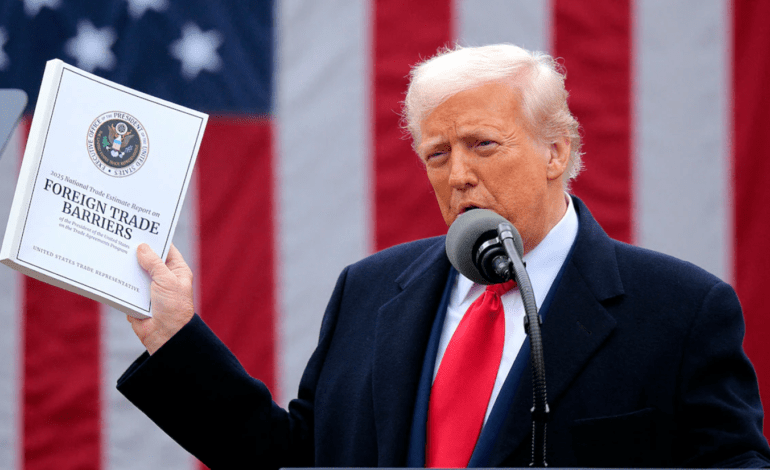
Global Shockwaves from President Trump’s ‘Liberation Day’ Tariffs
By: Dr. Avi Verma
On April 2, 2025, President Donald Trump announced the ‘Liberation Day’ tariffs, introducing a universal 10% tariff on all imported goods, effective April 5. Additionally, country-specific tariffs were imposed, including a 34% tariff on Chinese goods (in addition to an existing 20% tariff), 26% on Indian imports, 20% on European Union exports, and varying rates for other nations.
Immediate Market Reaction:
Following the announcement, U.S. financial markets experienced significant declines. The Dow Jones Industrial Average plummeted by 1,679 points, marking its worst trading day since 2020. The S&P 500 and Nasdaq also saw substantial decreases, reflecting investor concerns over potential economic repercussions.
Economic Implications in the U.S.:
Economists expressed concerns about the potential for stagflation—a combination of stagnant growth and rising inflation. Goldman Sachs increased the probability of a U.S. recession to 35%, citing factors such as inflationary pressures and supply chain disruptions. Industries like automotive, technology, and retail anticipated increased costs, likely to be passed on to consumers, exacerbating inflation concerns.
Global Economic Impact:
The tariffs raised fears of a global economic slowdown. Major economies, including the European Union and Canada, vowed retaliation, potentially escalating into a broader trade conflict. Asian countries, notably Vietnam, Cambodia, and Thailand, faced significant tariffs, posing challenges to their export-driven economies.
Recession Risks:
The International Monetary Fund (IMF) has cautioned that escalating trade conflicts could significantly reduce global GDP, increasing the risk of recession in multiple economies.
Responses from Global Leaders:
International leaders criticized the tariffs. The European Union and Canada indicated intentions to implement countermeasures. China and other affected nations expressed concerns, with some seeking diplomatic solutions to mitigate the impact.
U.S. Senate Opposition:
In a bipartisan effort, the U.S. Senate voted 51-48 to overturn President Trump’s national emergency declaration used to justify tariffs on Canadian imports. Republican senators, including Susan Collins and Lisa Murkowski, joined Democrats in opposing the tariffs, citing potential negative impacts on the economy and small businesses.
India’s Position:
India faced a 26% tariff on its exports to the U.S. The Indian government announced it was studying the implications of these tariffs and exploring opportunities arising from the change in U.S. trade policy. Both nations had previously aimed to increase bilateral trade to $500 billion by 2030 and were engaged in negotiations for a comprehensive trade agreement.
Conclusion:
President Trump’s ‘Liberation Day’ tariffs marked a significant shift in U.S. trade policy, leading to immediate market reactions and raising concerns about both domestic and global economic stability. The situation continues to evolve as affected countries consider responses and potential countermeasures.